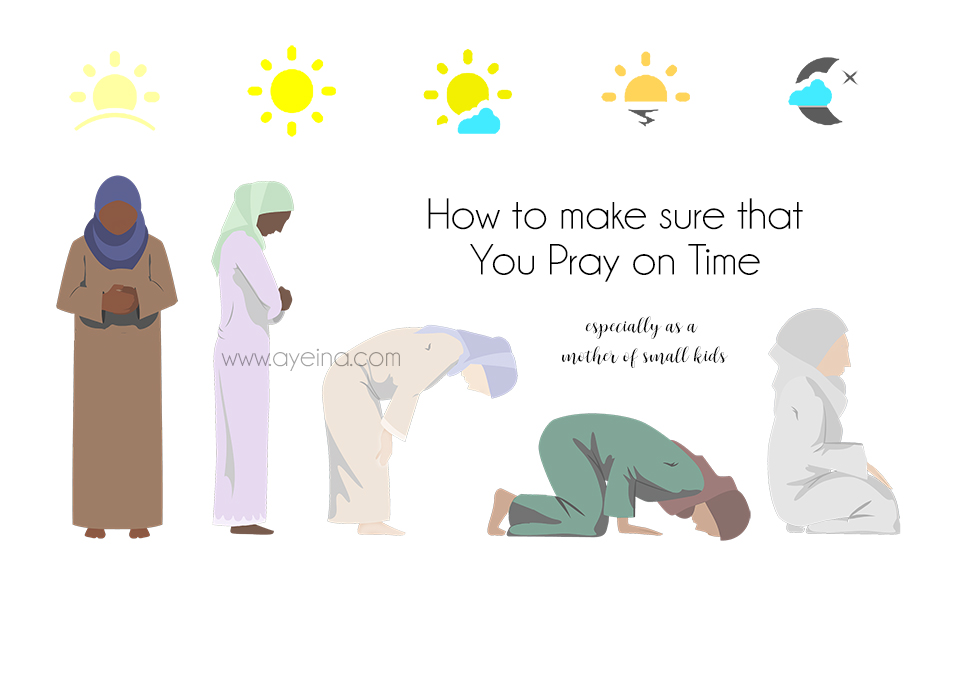Know the Importance of Salah
Prophet (ﷺ) said: “Between disbelief and faith is abandoning the Salat.” [Tirmidhi]
So missing Salah is out of the question. The concern here is, how do we improve our prayers by praying on time (as soon as the adhaan is called out) amidst our busy lifestyles. .
Ibn Mas’ud said: “I asked the Messenger of Allah: ‘O Messenger of Allah! Which is the most virtuous of deeds?’ He said: ‘Salat during its appropriate time.’…[Tirmidhi]
The question is: “What is the appropriate/prescribed time and what is considered praying late?”
First of all, Qada is not considered a late prayer. It’s simply a missed prayer. Missing the prayer intentionally is considered a major sin, unless that is for a legitimate excuse such as sleeping or unintentionally forgetting (If that happens, pray as soon as you get up or recall).
…Muhammad ﷺ said: “If anyone forget saying prayer, he should observe it when he recalls it, for Allah has said (in the Qur’an): “Establish prayer for my remembrance”… [Abu Dawud]
Praying late
Now lets talk about what is exactly a late prayer!
Allah says in the Qur’an: “So woe to those who pray. who are heedless of their prayer.” [107:4-5]
Although it is permissible to offer a prayer by the end of its time, but it is better to do the prayer at the beginning of its time, except for Isha prayer as it is Sunnah to delay ‘Isha a little. Prescribed time for Isha is till one-third of the night (which means that if the time between Isha adhaan and the Fajr adhaan is 9 hours (for eg: 8pm – 5am), then 1/3rd part of the night finishes at 3rd hour point (for eg: 11pm)). You may pray as soon as the adhaan is proclaimed or you can delay for an hour or two more (depending on your time zone). Muhammad ﷺ did not like to talk after Isha, so you can wrap up the day, pray Isha and then sleep.
In the case of other prayers, it is better to pray them sooner unless there is a legitimate reason for doing otherwise.
The Messenger of Allah (ﷺ) said: The time of the noon prayer is when the sun passes the meridian and a man’s shadow is the same (length) as his height, (and it lasts) as long as the time for the afternoon prayer has not come; the time for the afternoon prayer is as long as the sun has not become pale; the time of the evening prayer is as long as the twilight has not ended; the time of the night prayer is up to the middle of the average night and the time of the morning prayer is from the appearance of dawn, as long as the sun has not risen; but when the sun rises, refrain from prayer for it rises between the horns of the devil. [Muslim]
Praying on Time
After seeing a couple of red marks on the prayer tracker, we were trying to figure out what is making us pray later than the beginning of time and we constantly found ourselves blaming motherhood responsibilities for all that delay!
Allah says in the Qur’an: “O you who have believed, let not your wealth and your children divert you from remembrance of Allah. And whoever does that – then those are the losers.” [63:9]
To be honest, our kids won’t carry our burdens for us on the day of judgement nor will anyone else. We will! Only us!
‘Aishah (May Allah be pleased with her) was asked: “What did Messenger of Allah (ﷺ) used to do inside his house?” She answered: “He used to keep himself busy helping members of his family, and when it was the time for Salat (the prayer), he would get up for prayer.” [Bukhari]
So we figured that us blaming our kids and their endless demands won’t really help! But of course that’s easier said than done. Because if you’re a mother of small children (younger than 3-4 years old or 2 kids under 5 years of age), it’s NOT easy! At all! You’re constantly on-duty and responsibilities never seem to end! Babies/toddlers etc. are constantly depending on you for every human need. So a peaceful break is only a dream most of the times.
Hence we’ve been trying to figure out how to get kids into this prayer routine with us instead of trying to get away from them for this ideal khushoo time. We tried working on different methods where kids can associate prayer with bonding time as well instead of thinking that this is only a mama-thing. We really want our children to grow up loving the prayer after all. Don’t we?
Practical Steps
Following are the things that have personally helped us:
1) Mental and Physical Preparation:
First ask yourself – How serious are you about getting your life back on track? Are you going to schedule your prayers anywhere in the middle of your busy schedule or are you going to schedule your busy lifestyle around the 5 daily prayers?
Once you are motivated enough, physically prepare yourself! For example:
a) sleeping early at night and setting up multiple alarms to be able to get up for Fajr.
b) drinking ample water so your body is forced to wake up before sunrise.
c) making your surroundings clutter-free and shortening your to-do lists so you are not too exhausted to even stand up for a prayer.
2) Prayer Tracker:
A Prayer tracker is a visual way of tracking your prayers. Color coding it or making a graph of your decline or progress – Studies have shown that in order to form a new habit, you have to do that activity for 21 days (or a whole month). But it all depends on the person, circumstances and most importantly the motivation and persistence – if the habit is not built within a month, there’s always another month in shaa Allah (for eg: if we will see the red marks (praying later than the beginning of time) more than the green marks (praying as soon as the adhaan is called out), then we will reprint the tracker and hence repeat the process in shaa Allah).
3) Prayer/Adhaan App:
In a world of constant digital consumption, a way of using technology to your own benefit can become a challenge at time. Find an app that announces the adhaan on your mobile whenever the time starts (especially if the mosque isn’t nearby and you can’t hear the call for 5 daily prayers) – choose any that you may like. We’re constantly on the lookout for one (as we keep switching from one to another) so if you have suggestions, would love to hear them in shaa Allah.
4) Accountability Partner:
Find someone who you can show your prayer tracker to – somone who can make sure you’re on top of your habit-building routine in shaa Allah. Just grab onto a person closest to you. Someone you are in touch with day in and day out! If you can’t find someone to boost your eemaan offline, find a friend online. We sisters are accountability partners for each other in this productive journey and you all can hold us accountable as well since we’ll be doing this publicly! (super scary and embarrassing at times – but whatever helps, right?)
5) Persistence
(I loved the following excerpt from the article I recently read: “There may be times where you feel spiritual exhilaration through prayer; your heart may feel like it’s flying, your eyes may tear up because of a closeness you experience with your Creator. Then there may be times where you feel absolutely nothing; this can make you feel like you’re doing something horribly wrong or that it’s not worth continuing because it doesn’t make you feel any different. However, be careful not to get addicted to the ‘feeling’ by choosing only to continue praying as long as it ‘feels’ good and despairing in Allah and leaving prayer once you no longer ‘feel’ it. Praying is an obligation. Remember that you are doing this action to the best of your ability for the sake of God, not just because it makes you feel good.”
Try switching up places if you don’t feel that sense of excitement praying at the same place each time.
Quick Tips on Praying on Time as a Mother of Small Kids
We asked mothers on our social media accounts to share the tips and experiences on praying peacefully with khushoo (as a mother of small kids) and following points are the conclusion of the answers we got:
1) Carry the babies while praying or let them lie down beside you as you pray – It is not only the sunnah of the Prophet (ﷺ), but also because little kids attached to you/around you are much more calmer alhamdulillah and you get to pray more peacefully – (You can pray while sitting if it gets hard on your back in case you are using slings or carriers to carry a baby while praying). My 4 yr old daughter still likes to lie down beside me as I pray and sometimes hug me as I prostrate while my 1yr old sometimes giggles as she hears me say “subhaana rabbi yal a’laa” (Glory be to Allah My Lord, the Most High) – she puts her ear close to my mouth (sometimes touching her cheek to mine). It’s a special feeling. I elongate my sajdah if I feel like she wants to hear more of that 🙂
2) Let the kids hear the adhaan loud and clear so they know that it’s time to pray (if you don’t have a mosque nearby, you can use any adhaan app that notifies you with the adhaan when the time comes – as mentioned above). Then sit with them and quietly listen to it (while answering the call to prayer) – .
3) Explain this 2nd most important pillar of Islam with love – Use books, toys, crafts (or whatever that works with your child) to teach them what prayer means and how important it is for us to connect to Allah and turn back to Him multiple times a day.
4) Do wudu together – let them do wudu with you – it won’t only teach them the steps but also connect them to Islam in a loving way (if there’s a lot of water-waste/water-mess as a result, let them do tayammum only :D)
5) Get them their own prayer garments/prayer mats – Getting kids their own special garb for the prayer and their own sticker-ish Prayer Tracker is an awesome way to get them pray with you. We personally use “my salah mat” for children so they know it’s their special mat to pray.
6) Pray with them – They may constantly just do sajdah over sajdah or stand with you and just mumble 😂 They may leave after a while or not want to pray at all. They may just lie down in front of you – looking at you carefully or they may hug you or ride on your back when you prostrate (I personally love that – makes me want to do longer sujood and reminds me of how Prophet (ﷺ) would elongate his sajdah if a child would hop onto his back). All of that is perfectly ok! The idea is to make prayer inclusive for them.
7) Make dua with them – Mine just keeps saying “Allahumma inni naafiyah” but it would do 😀 because one day, in shaa Allah – they will love the prayer and look forward to praying with us or without us. One day we may be praying all alone at home and smile at the thought of them praying in their own homes as well in shaa Allah. THAT would be our peaceful salah! The peace in knowing that we tried our best to instill the love of prayer in their hearts – even if that meant that we had to sacrifice our own peace in the process. One day it will be worth it bi’idhnillah!
If you have more tips on praying peacefully and with khushoo as a mother of small kids, please share your experiences below and help everyone out!
—————————————————————————————–








Salam! This is wonderful mashaAllah! Jazak Allah Khayr for all of the helpful tips!
JazakAllah khair for sharing your tips, very helpful. You are right, it is so easy to blame it on the kids but as you say they won’t be carrying the burden.
Masha Allah love these tips – very beneficial
JazaakilLah khairan. I think that if I am able to make time for other things in my life, then salaat must be the first thing to make time for and plan it in my planners. Such great tips for establishing saaat and on time.
Jazak Allahul khair for the tips. Hadith about prophet Muhammed SAW helping his family until he hears call of prayer, never ceases to amaze me. It clearly showed that Salat was his highest priority . There is so much more to this Hadith.
May we serve as excellent role models for our children to follow. Ameen
Thanks for the post. It was quite informative especially the tips mentioned for mothers would encourage not only the mothers but also the children to indulge in prayers.
Thanks